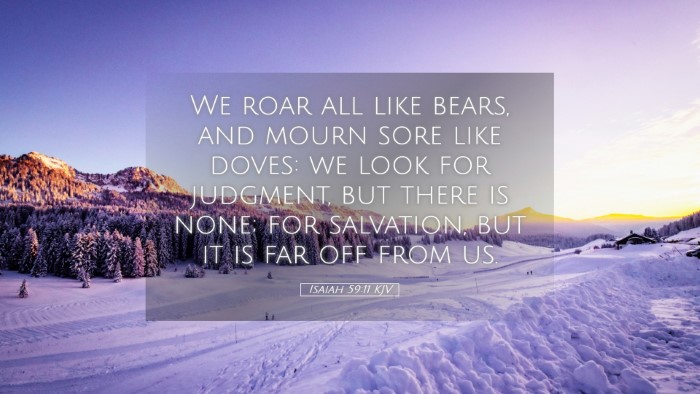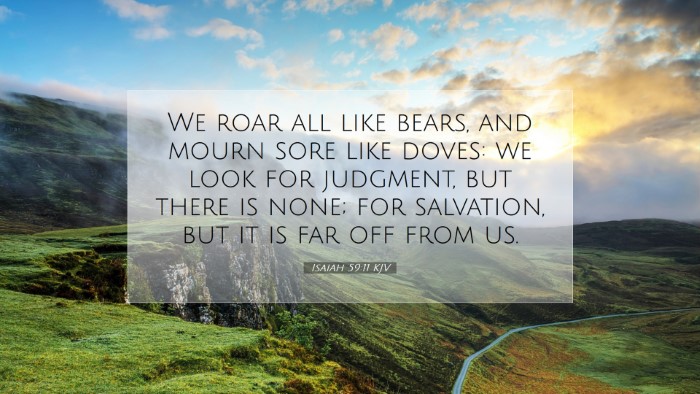Commentary on Isaiah 59:11
Isaiah 59:11 states, "We all groan like bears; we moan and lament like doves. We look for justice, but there is none; for salvation, but it is far from us." This verse reflects a deep yearning for justice and relief from suffering. It highlights the spiritual and moral state of the people and offers profound insights based on the commentaries from Matthew Henry, Albert Barnes, and Adam Clarke.
Contextual Overview
Isaiah, often referred to as the "messianic prophet," addresses the spiritual condition of Israel, revealing the consequences of sin and the hope for redemption. Chapter 59 specifically discusses the barriers caused by sin that separate humanity from God, leading to the cry for justice mentioned in verse 11.
Matthew Henry's Insights
Matthew Henry provides a thorough analysis of the implications of this verse in his commentary:
- Desperation in Suffering: Henry points out that the metaphor of groaning like bears signifies a deep sense of distress. Here, bears may represent powerful creatures in anguish, illustrating the intensity of the people’s pain and suffering.
- Loss of Justice: He elaborates on the lamentation over the absence of justice, which is a central theme in the prophetic tradition. The people express their frustration at the systemic injustice in society.
- Yearning for Salvation: The mention of salvation being 'far from us' reflects the bleak spiritual condition of Israel. Henry emphasizes the importance of recognizing this distance to understand the need for divine intervention.
Albert Barnes' Perspective
Albert Barnes adds further depth with his observations:
- Metaphorical Language: Barnes notes the significant use of metaphors in this verse. The comparison to bears and doves signifies not only pain and helplessness but also the intrinsic desire for peace and restoration.
- Faith Under Duress: He also highlights that the cry for justice and salvation indicates a faith that persists even in suffering. Barnes interprets this lamentation as an acknowledgment of sin and dependency on God’s mercy.
- Historical Context: He connects the longing for justice to the historical circumstances of Israel, mentioning how the society was plagued with corruption and moral decay, leading to a collective outcry.
Adam Clarke's Analysis
Adam Clarke offers an insightful interpretation that encompasses both the theological and practical dimensions:
- Human Vulnerability: Clarke explains that the groaning of the people symbolizes human vulnerability in the face of overwhelming challenges and the need for divine compassion.
- The Nature of God's Justice: He asserts that God's justice is integral to His character and that humanity's lack of justice is a cause of their suffering. The verse reflects the profound rift caused by sin.
- Anticipation of Redemption: Clarke emphasizes that even amidst this despair, there is an undercurrent of hope. The recognition of salvation being distant serves to propel the faithful towards seeking God earnestly.
Theological Implications
This verse offers rich theological implications for pastors, students, and scholars:
- Spiritual Diagnosis: It serves as a call to reflection on the moral and spiritual condition of individuals and communities, encouraging self-examination and repentance.
- Awareness of Divine Justice: It highlights the essential nature of divine justice. As believers, one must grapple with the reality that God is aware of injustice and sin, and this should compel active participation in the pursuit of justice.
- Hope Despite Desperation: The progression from despair to the anticipation of salvation indicates a foundational truth in the Christian faith: God’s promises transcend current suffering. This perspective is crucial for pastoral care and counseling.
Practical Applications
Isaiah 59:11 encourages practical applications for daily Christian life:
- Community Engagement: Believers are called to engage actively in societal issues, reflecting God’s justice in tangible ways.
- Intercession: The groaning and lamentation can serve as a model for prayer, emphasizing intercession for justice, mercy, and guidance.
- Perseverance in Faith: The reminder of salvation being distant reinforces the necessity of persistence in faith, trusting in God’s ultimate plan and timing.
Conclusion
Isaiah 59:11 encapsulates the heartfelt cry of a society yearning for justice and salvation. Through the combined insights of Matthew Henry, Albert Barnes, and Adam Clarke, we understand the complexities of human suffering, the nature of divine justice, and the enduring hope for redemption. This verse remains a poignant reflection on the human condition, faith, and the divine response to sin and injustice.


